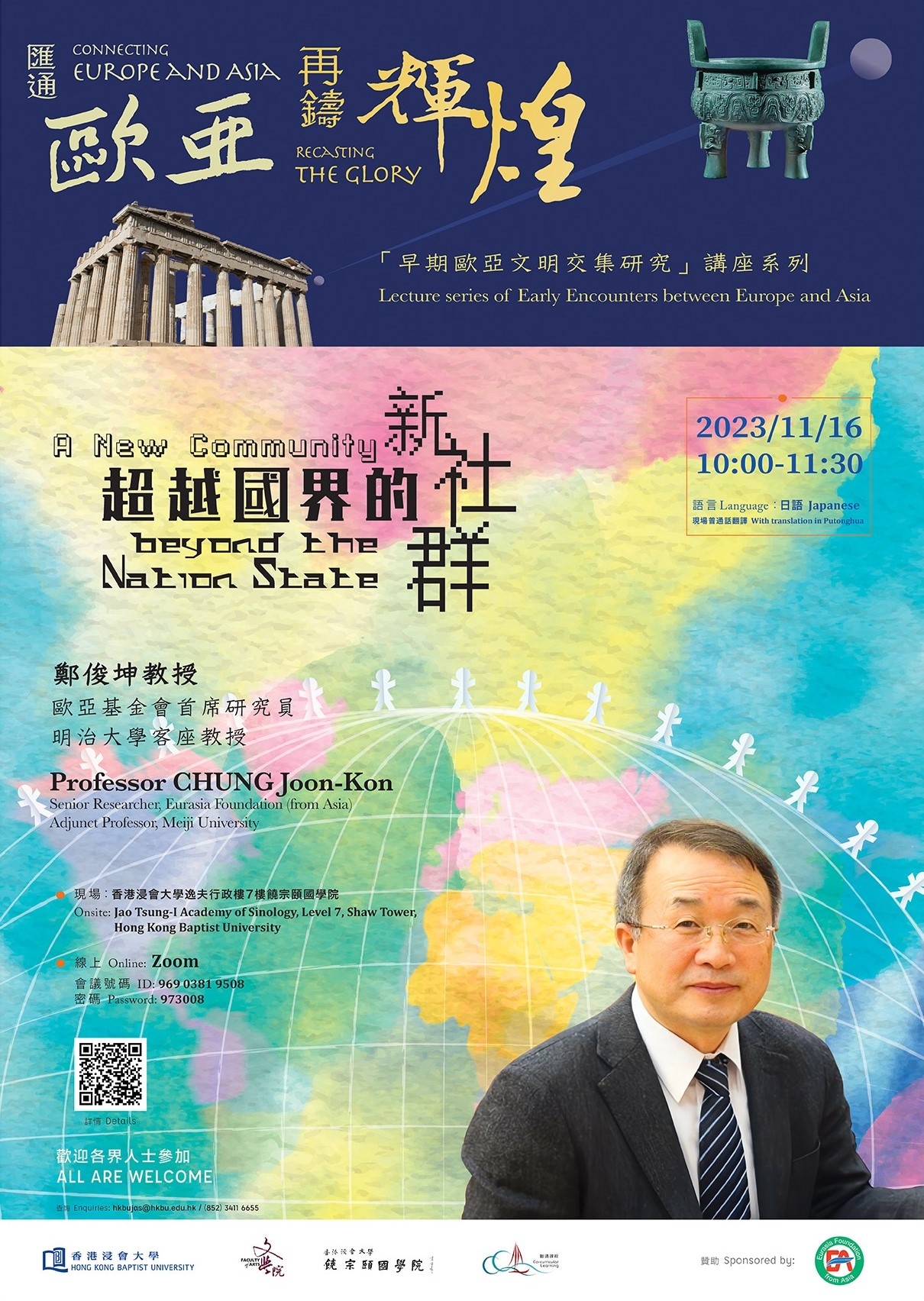
Connecting Europe and Asia, Recasting the Glory: Lecture series of Early Encounters between Europe and Asia
Lecture 7: A New Community Beyond the Nation State
2023/11/16 │ 10:00–11:30
Professor CHUNG Joon-Kon
Senior Researcher, Eurasia Foundation (from Asia)
Adjunct Professor, Meiji University
- Abstract:Today, in a society profoundly shaped by globalization, the role of sovereign nations is undergoing momentous changes. We are facing a situation in which existing nation states are nearly powerless by themselves, and the very idea of nations and individuals is being called into question.
The 2011 Great Eastern Japan Earthquake and the accompanying nuclear disaster, and the 2020 novel coronavirus pandemic have shocked humanity beyond imagination. These unprecedented experiences have highlighted problems in modern civilized society, and in the roles not only of individuals but of entire communities. Causing wide-spread risk and unimaginable harm, these natural and man-made disasters have given people around the world the opportunity to reflect on some fundamental issues. Crises occurring on a global scale, across national borders, have demanded a paradigm shift on matters such as the relationship between states and individuals, industry and life, the role of capitalism, and the meaning of human civilization and progress.
Doubts have been cast in the international community about the unconstrained decisions of sovereign nations within the framework of national borders. We are already experiencing how decisions made autonomously by sovereign nations within their own borders can have destructive consequences not only on the surrounding regions, but on the entire global village. We need to change the way we think about global issues such as disparity, poverty, environment, energy, food, human rights, security, and more. In this context, multilateral cooperation is vital, and can only be achieved on two conditions: creating an environment that welcomes open discussion and building relationships of mutual trust across all barriers.
Recent events have alerted people all over the world to the need for considering multilateral cooperation and solidarity beyond the nation state. Today, the time has come for us to change course, moving away from social structures, value systems, and ideas of society that pursue only economic efficiency while neglecting the environment and human life. Since its inception, humanity has sought to create a comfortable environment of freedom, equality, safety, and happiness, through innumerable trial and errors. We are now called upon to explore, along this same trajectory, a new form of community, a new way of living together.
From this vantage point, I would like to explore with you the new transnational, transethnic communities that the future will demand (such as Asian Community). In this lecture, I would like to consider the viewpoints, concepts, and necessity of these new communities from the perspectives of time, space, and people.
- Language: Japanese (with translation in Putonghua)
- Summary (Recorded by Zhang Zixuan)
The lecture ‘A New Community beyond the Nation State’ given by Professor Chung Joon-kun, Senior Research Fellow at the Eurasia Foundation and Visiting Professor at Meiji University in Japan, fused together Professor Chung’s profound concern and unique thinking regarding global issues facing our contemporary world in respect of realms that include social equality, poverty, the environment, energy, food resources, and human rights. His core viewpoints were: humanity has always sought to create a free, equal, safe, and happy environment in which it can live comfortably, but the modern system of sovereign nations is however unable to avoid multiple conflicts and crises; therefore, new multinational and multi-ethnic social entities can perhaps solve difficult problems of many sorts that are faced by society and thereby satisfy mankind’s aspiration to travel along a broad thoroughfare and reach a more idealised state of affairs.
Professor Chung first shared the aim of the Eurasia Foundation to ‘eliminate conflict’ and the three principles of its activities, namely, no restrictions placed on ethnicity and nationality, no limits to thought and religion, and no relationship to politics. Closely following this, he also analysed the two types of requirements most faced by human activities, that is, ‘possession’ and ‘relationship’. Then, from the perspectives of time, space, and the human being, he deconstructed the gap between internal components and the whole system, or the individual and the social entity, and concluded that only in this way can the most fruitful potential for human development be fully realised. As Alexis de Tocqueville has articulated: ‘Those who only understand a particular country are equivalent to those who do not understand even one particular country.’ These new social units who, from the perspective of the whole world, transcend national boundaries are not bound by the restrictions of their own special location and possess characteristics of diversity and tolerance. In this way, mankind can overcome the obstacles of ‘old walls’ and graduate from the limits imposed by ‘internal walls’ into the formulation of new ‘systemic walls’. Greater protection is thus afforded to human life and resources, allowing mankind to live more freely, comfortably, peacefully, and happily.
This lecture, in addition to attracting teaching staff and students from all the constituent institutions and faculties of Hong Kong Baptist University to come in person and listen, also achieved an online audience that included more than fifty listeners from places such as the Chinese mainland (for example, Shanghai, Shenzhen, Lanzhou, Taiyuan, and Hangzhou), Taiwan, Singapore, Saudia Arabia, Australia, and Dubai, which meant that it was truly an unusually rich experience for all.
This lecture series is sponsored by Eurasia Foundation (from Asia).